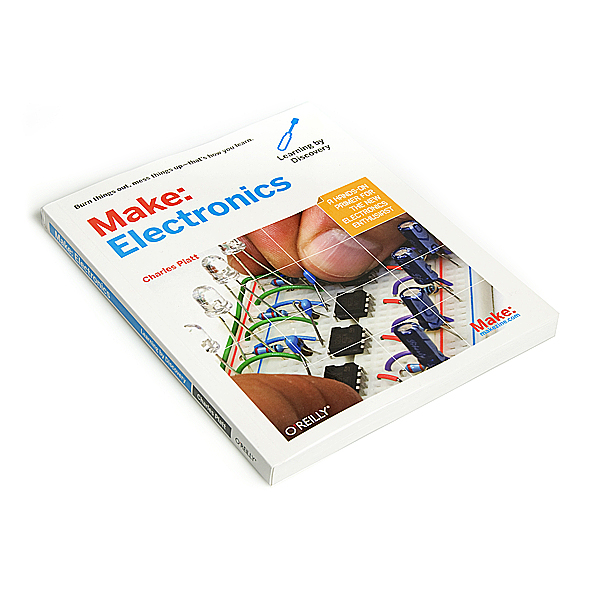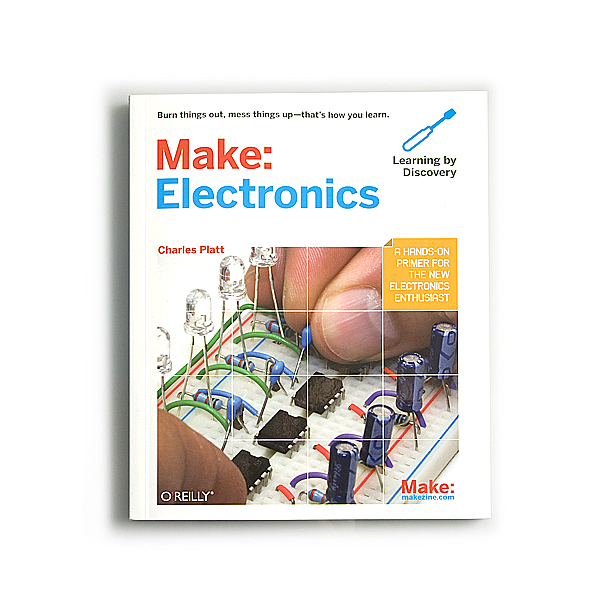Make: Electronics
Want to learn the fundamentals of electronics in a fun and experiential way? Start working on some excellent projects as soon as you crack open this unique, hands-on book. Build the circuits first, then learn the theory behind them! With Make: Electronics, you'll learn all of the basic components and important principles through a series of "learn by discovery" experiments. And you don't need to know a thing about electricity to get started.
Get step-by-step instructions on building working devices that demonstrate fundamentals such as voltage, amperage, resistance, inductance, and capacitance. Then tackle more complex electronics concepts, including analog/digital conversion, logic gates, and integrated circuits. Along the way, you'll learn valuable tips and techniques, always with clear explanations of what you're doing and why.
- Start out by breaking things -- experiment with components and learn why you experience failure
- Set up a tricked-out project space -- your own at-home work area, equipped with all of the tools and parts you'll need for the experiments in this book
- Learn about all of the key electronic components and their functions within a circuit through a series of clearly presented, well-illustrated experiments
- Create a car alarm, holiday lights, wearable electronic jewelry, audio generators, a crystal radio, and a touch-sensitive lamp
- Work with brushed DC and stepper motors to understand their principles and applications
Learn about programmable microcontrollers by building an automous robot cart that can sense its environment and avoid obstacles
If you've always wanted to learn electronics, but were intimidated by other books and overly-technical websites, this book is for you!
Info:
- Author: Charles Platt
- Publisher: O'Reilly Media, Inc.
- Paperback: 350 pages
- ISBN-10: 0596153740
- ISBN-13: 978-0596153748
Make: Electronics Product Help and Resources
Core Skill: Electrical Prototyping
If it requires power, you need to know how much, what all the pins do, and how to hook it up. You may need to reference datasheets, schematics, and know the ins and outs of electronics.
Skill Level: Noob - You don't need to reference a datasheet, but you will need to know basic power requirements.
See all skill levels
Comments
Looking for answers to technical questions?
We welcome your comments and suggestions below. However, if you are looking for solutions to technical questions please see our Technical Assistance page.
Customer Reviews
No reviews yet.



I really like this book. He has a lot of interesting projects with great photos and detailed diagrams. Full color. The hardest part about it is finding all the parts you need for the projects. I have had to order parts from three or four different sites (including Sparkfun) and sometimes I order the wrong parts because I'm just beginning (of course) and don't really know how to order electronic parts. For example, I ordered a bunch of 555 chips (on another site), not realizing that they were tiny and won't fit my breadboard.
It would be great if Sparkfun would put together parts kits for this book. Maker Shed says they are working on this, but they don't have anything yet. If you simply stocked all the parts he lists, that would be great. For example, adding 2N6027 PUTs. He uses them a lot, but these are actually pretty unusual (or so I've learned) and hard to find.
http://www.makershed.com/ProductDetails.asp?ProductCode=MECP1
and
http://www.makershed.com/ProductDetails.asp?ProductCode=MECP2
Are the official Makershed kits, but they sacrifice price for getting most of the components in. They also come with some 'extra stuff'; i.e., helping hands, antistatic wristband etc. Good kit to start out electronics on, though.
REALLY good electronics book. It explains some important things without being too difficult to red or wordy. I've learned a lot by reading this, and I'm glad I bought It. If you are interested in electronics, you should definitely get this. Also, Charles platt has written a second book " make more electronics" , and there is a comprehension kit available for this.
This is a fantastic book for beginners it really got me to understand allot & now I'm working on programming.
This is the book that originally got me into electronics. Picked it up at Barns N Noble not really knowing if I was wasting my money or not and it definetely taught me alot! Definitely recommend.
I think I've already gotten through 1/2 the break stuff part; I burned my finger blowing up a diode like 3 days ago (really stupid accident, I connected it backwards to like 500 times the power it's rated for. Damaged the 9v lithium battery too) and also blew a 2N3904 transistor.
@tech20,
He uses PICAXE.
I personally own this book, and i cant put it down.
I recommend this to the beginner and intermediate alike.
Lots to learn.
When it comes to the microcontroller part in the end, is it pic, avr, pic-axe, or some other micro?
I should really pick this up. Looks like a great choice for beginners. Thanks for adding the Books category, too, SparkFun!
Thanks Bret! I've been amazed at the quality of easy-to-follow hardware books and Make: Electronics is right up there. It's big on the analog side of circuits, but in general we were very happy with it.
We now carry enough books it made sense to create it's own category. It's a big day when we create a new root category ;)